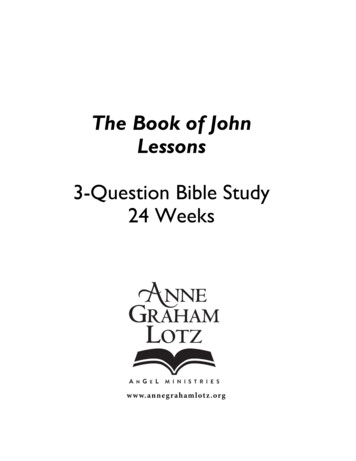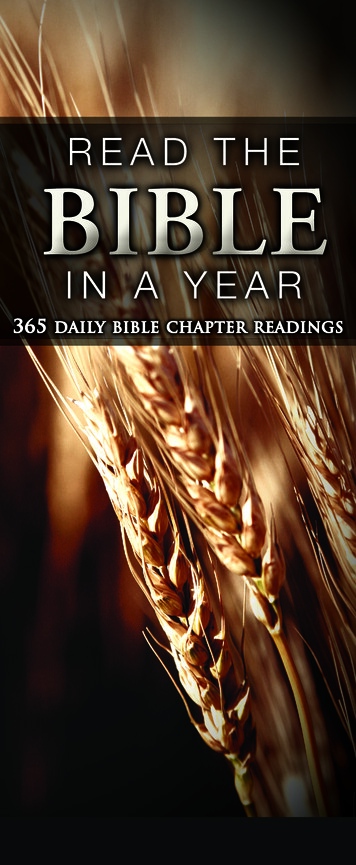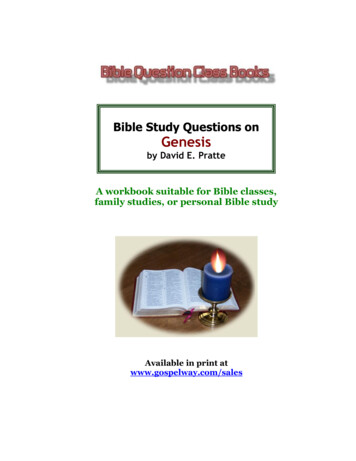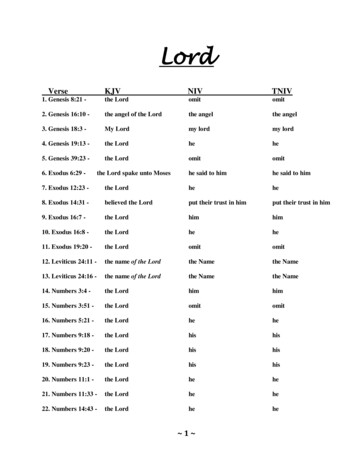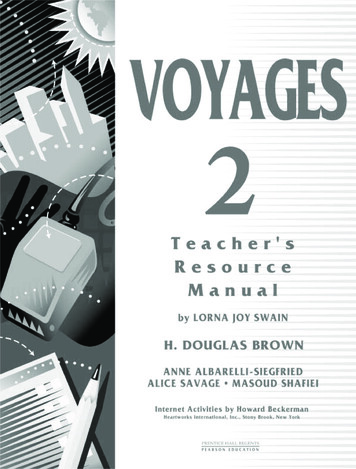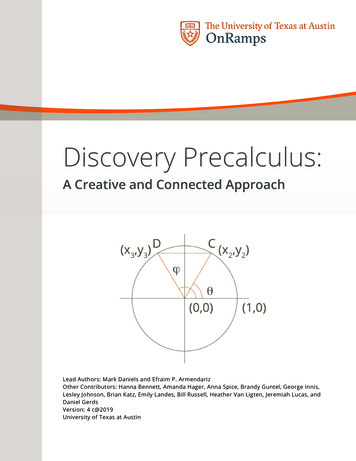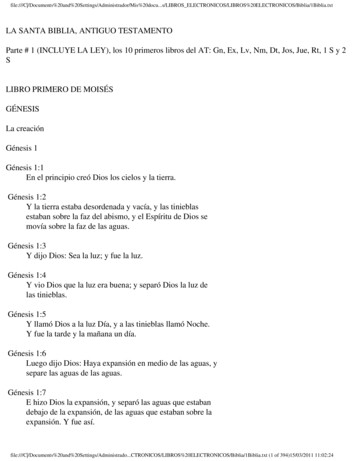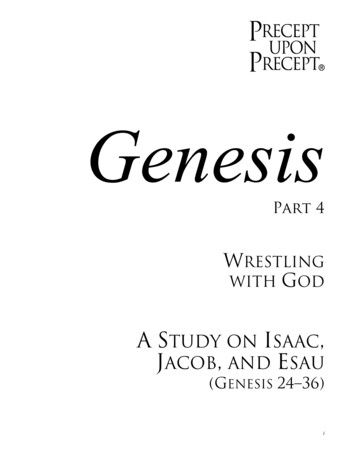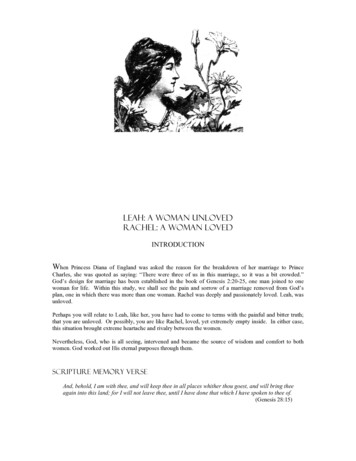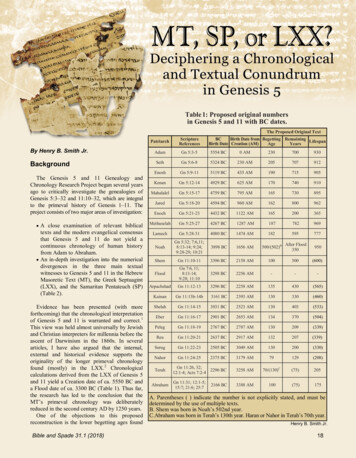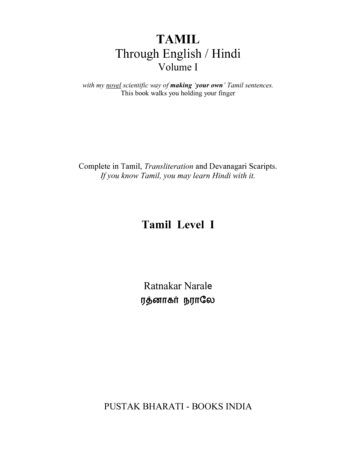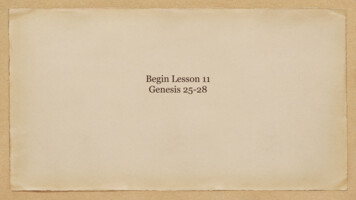
Transcription
Begin Lesson 11Genesis 25-28
AnnouncementSummer Intense course:Mary in the Bible: A Study of DiscoveryJuly 27-28-29Morning session: 9:15 to 10:45 amEvening session (repeat of morning session): 6:00 to 7:30 pmConsider & pray about friends you might bring—especially protestantfriends because we will limit our study of Mary to the Bible. ProtestantBibles are welcomed too!
St. Thomas Aquinas: Prayer before StudyCreator of all things, true Source of light and wisdom, lofty origin of all being,graciously let a ray of Your brilliance penetrate into the darkness of my understandingand take from me the double darkness in which I have been born,an obscurity of both sin and ignorance.Give me a sharp sense of understanding, a retentive memory,and the ability to grasp things correctly and fundamentally.Grant me the talent of being exact in my explanations,and the ability to express myself with thoroughness and charm.Point out the beginning, direct the progress, and help in completion;through Christ our Lord.Amen.St. Thomas Aquinas
“Abraham took another wife, whose name was Ketu'rah. 2She bore himZimran, Jokshan, Me'dan, Mid'ian, Ishbak, and Shuah. 3Jokshan was thefather of Sheba and De'dan. The sons of Dedan were Asshu'rim, Letu'shim,and Le-um'mim. 4The sons of Mid'ian were E'phah, E'pher, Ha'noch, Abi'da,and Elda'ah. All these were the children of Ketu'rah. 5Abraham gave all hehad to Isaac. 6But to the sons of his concubines Abraham gave gifts, andwhile he was still living he sent them away from his son Isaac, eastward to theeast country” (Gen 25: 1-6)
Ketur’ah is a concubine taken as a second wife to Abraham. She bears himadditional sons and like Abraham did to his firstborn, Ishmael, he also sendsthem away. In verse 5 we read, “Abraham gave all he had to Isaac.” Thisconfirms that Isaac has displaced Ishmael as the heir of the Abrahamicblessings and birthrights. In ancient tribal societies, it was highly irregularto pass over the first born to a younger son—but in Genesis, God selects ayounger son to receive priestly responsibilities, their father’s specialblessings, inherit the largest amount of lands and wealth, and become thepatriarchal leader of the family. Only three times has the eldest son receivedthese blessings and birthrights:
Sons Who Receive the Birthright & Blessings—Becoming the Family PatriarchFirst BornNoah—Gen 5Shem—Gen 6Abraham—Gen 11 & 12Shem is the preeminent,faithful first born son whoprefigures Jesus—the faithfulfirst born son of God.Not the First BornAbel is favored over Cain—Gen 4Isaace is favored over Ishmael—Gen 17 & 21Jacob if favored over Esau—Gen 25 & 27Perez is favored over Zerah—Gen 38Joseph is favored over Reuben—Gen 35Ephraim is favored over Manasseh—Gen 48Note!!! “Isaac is the only patriarch who does not leave(Noah & Abraham, were less the Promised Land and the only patriarch who is faithfulthan faithful and Abraham did to his wife. The reward of chastity is the ability to live innot inherit from his father—he the Promised Land unmolested.” From Grey & Cavins, “Walkingreceived his kingship fromwith God” Ascension Press 2010, pg 47-48God).
Read Genesis chapter 25:7-18The death of Abraham and the descendants of Ishamel
Note that Abraham is buried in the plot of land where Sarah is buried—theland that he had purchased from the Hitites.Genesis 25:12-18 tells us of Ishmael’s 12 sons by his Egyptian wife. Theyspread across northern Arabia (25:18). “Ishmael is traditionally consideredthe father of the Arabs in Jewish tradition.”Hahn & Mitch, Commentary in Ignatius Catholic Study Bible: Genesis pg 50
Introduction to JacobChiasm for JacobA. Stuggle in Childbirth: Jacob Born (Gen 25:19-34)B. Rebekah in a Foreign Palace, Covenant with Foreigners (Gen 26: 1-34)C. Jacob Fears Esau and Flees (Gen 27:1-28:9)D. Messengers/Angels from/to God (Ten 29: 1-30)E. Arrival at Haran (Gen 29:1-30)F. Jacob’s Wives are Fertile (Gen 29:21-30:24)F. Jacob’s Flocks are Fertile (Gen 30:25-43)E. Departure from Haran (Gen 31:1-54)D. Messengers from/to Esau & the Messenger of the Lord (Gen 32:1-32)C. Jacob returns and fears Esau (Gen 33:1-32)B. Dinah in a Foreign Palace; Covenant with Foreigners (Gen 34:1-31)A. Struggle in Childbirth: Jacob becomes Israel (Gen 35:1-22)
Read Gen 25: 19-26“The Birth of Esau and Jacob 19 * These are the descendants of Isaac, Abraham’s son:Abraham was the father of Isaac, 20and Isaac was forty years old when he took to wifeRebekah, the daughter of Bethu'el the Arame'an of Pad'dan-ar'am, the sister of La'ban theAramean. 21And Isaac prayed to the LORD for his wife, because she was barren; and theLORD granted his prayer, and Rebekah his wife conceived. 22The children struggled togetherwithin her; and she said, “If it is thus, why do I live?” q So she went to inquire of the LORD.23And the LORD said to her, “Two nations are in your womb, and two peoples, born of you,shall be divided; the one shall be stronger than the other, the elder shall serve the younger.”24When her days to be delivered were fulfilled, behold, there were twins in her womb. 25Thefirst came forth red, all his body like a hairy mantle; so they called his name Esau. 26Afterwardhis brother came forth, and his hand had taken hold of Esau’s heel; so his name was calledJacob.r Isaac was sixty years old when she bore them.”
Rebekah inquires of the Lord rather than of Isaac-going to God herselfThe Lord answers herWomen are very much a part of the plan of SalvationShe prefigures the Virgin Mary who inquires about the birth of her son
God’s promise to make a great nation of Ishmael was fulfilled.So through both sons, Ishmael and Isaac, great nations arose.The same will be for the sons of Isaac, Esau and Jacob. Jacob will receive hisfather’s blessing and the promise to Abraham that the whole world will findblessing in one of his descendants. This promise from God passes down fromAbraham, through Isaac (the true heir) to Jacob (the inheritor of the blessingeven if by deceit)—eventually toJesus Christ THE Blessing for the whole world.From Esau (also called Edom) the great nation to descend was theEdomites.From Jacob (whose name later becomes Israel) will come the Israelites.
By Her PatienceCommentary by St. Ambrose“Now Rebekah conceived and by her patience untied the knotof sterility. Let us consider what her prophetic and apostolicsoul brought to birth, and how, ‘She went to consult the Lord’,because the children leapt up in her womb, and she receivedthe reply, ‘Two nations are in your womb.’ for of herself shepresumes nothing but invokes God as supreme protector ofher counsels; filled with peace and piety, she joins two nationstogether by her faith and by prophecy and encloses them inher womb, so to speak. Not without reason is she called‘sister’ rather than wife, because of her gentle and peaceablesoul enjoys a reputation for affection common to all ratherthan for union with one individual and because she thoughtthat she was bound to all rather than to one.”Portrait by Paolo Veneziano in the 14th Century
Listen to Saint of the Day, 1 1/2 minutes ay/saint-ambroseEmperor Theodosius Forbidden by St.Ambrose to Enter Milan Cathedral byAnthony van Dyck 1620St Augustine tells us of Ambrose and his mother, “Thusyou gave another answer through your priest, a certainbishop nurtured in the Church and trained in yourbooks. When that woman implored him to considerspeaking with me, to refute my errors, un-teach me evil,and teach me good he refused her, quite prudently, as Iunderstood later. He responded that I was as yetindocile, that I was inflated with my heresy’s novelty “but let him be. Only pray for him to the Lord: he willdiscover by reading what his error is ” She would notacquiesce to what he said but continued imploring “Goaway,” he said, “while you live, the son of these tears ofyours shall not perish!” (The Confessions of St.Augustine III, 12)
Read Gen 25: 27-34Esau Sells His Birthright 27 When the boys grew up, Esau was a skilful hunter, aman of the field, while Jacob was a quiet man, dwelling in tents. 28Isaac lovedEsau, because he ate of his game; but Rebekah loved Jacob. 29 Once whenJacob was boiling pottage, Esau came in from the field, and he was famished.30And Esau said to Jacob, “Let me eat some of that red pottage, for I amfamished!” (Therefore his name was called E'dom.) s 31Jacob said, “First sell meyour birthright.” 32Esau said, “I am about to die; of what use is a birthright tome?” 33Jacob said, “Swear to me first.” t So he swore to him, and sold hisbirthright to Jacob. 34Then Jacob gave Esau bread and pottage of lentils, andhe ate and drank, and rose and went his way. Thus Esau despised hisbirthright.
Esau’s bartering of his birthright for food serves as an example of the dangerof allowing the gratification of our appetites to take precedence over ourspiritual lives. The virtue of temperance places our appetites and passions atthe service of living a moral life and development of a spiritual life.commentary from the Didache Bible on verses 27-34From the Catechism of the Catholic ChurchFortitude is the moral virtue that ensures firmness in difficulties and constancy inthe pursuit of the good. It strengthens the resolve to resist temptations and toovercome obstacles in the moral life. The virtue of fortitude enables one toconquer fear, even fear of death, and to face trials and persecutions. It disposes oneeven to renounce and sacrifice his life in defense of a just cause. “The Lord is mystrength and my song” (Ps 118:14). “In the world you have tribulation; but be of goodcheer, I have overcome the world” (John 16:33). CCC 1808The martyr bears witness to Christ bears witness to the truth of the faith and ofChristian doctrine. He endures death through an act of fortitude. CCC 2473
Read in class Gen 26: 1-5followed by shortcommentaryRead in class Gen 26: 5-11followed by shortcommentaryRead in class Gen 26:12-25 followed by shortcommentaryRead in class Gen 26:26-35 followed by shortcommentaryRead Gen 27: 1-40By Gerbrand van den Eeckhout - This file was donated to Wikimedia Commons as part of a project by the MetropolitanMuseum of Art. See the Image and Data Resources Open Access Policy, CC0, https://commons.wikimedia.org/w/index.php?curid 57668866
God’s Providence turns wickedness to serve His plans“The witness of Scripture is unanimous that the solicitude of divineprovidence is concrete and immediate; God cares for all, from the least thingsto the great events of the world and its history. The sacred books powerfullyaffirm God’s absolute sovereignty over the course of events: “Our God is in theheavens; he does whatever he pleases” (Psalm 16:3). And so it is with Christ,“who opens and no one shall shut, who shuts and no one opens”(Rev 3:7). Asthe book of Proverbs states: “Many are the plans in the mind of a man, but it isthe purpose of the Lord that will be established” (Proverbs 19:21) CCC 303
Everything, all things, good and evil, God brings His good end from it. Jesus Christ, theNew Adam, recreates everything and he uses satan’s worst weapon, death, against himand conquers all evil. This world is broken and we suffer because of it. The earth itself isdisordered (fires, earthquakes, drought, floods etc) and we are disordered and live in thisbroken world with disease, misunderstanding, evil and sin. But look at suffering, whichis a horrible reality due to sin. Because of Jesus, it has redemptive power. God useseverything for His redemptive purposes and so can we when we join our sufferings to Histo redeem the world. St. Paul tells us how this works, “Now I rejoice in my sufferings foryour sake, and in my flesh I complete what is lacking in Christ’s afflictions for the sake ofhis body, that is, the Church” (Col 1:24). There is nothing really lacking in Christ’ssuffering—but because we have been incorporated into His Mystical Body—we are invitedto share in Hi redemptive work of salvation!So we see Jacob being very deceptive and stealing his brothers blessing and birthright.God still brings the Savior to the world to fulfill His promise out of this corrupt lineage.
“Now Esau hated Jacob because of the blessing with which his father had blessedhim, and Esau said to himself, “The days of mourning for my father are approaching;then I will kill my brother Jacob.” 42But the words of Esau her older son were told toRebekah; so she sent and called Jacob her younger son, and said to him, “Behold,your brother Esau comforts himself by planning to kill you. 43Now therefore, myson, obey my voice; arise, flee to La'ban my brother in Haran, 44and stay with him awhile, until your brother’s fury turns away; 45until your brother’s anger turns away,and he forgets what you have done to him; then I will send, and fetch you from there.Why should I be bereft of you both in one day?” 46 Then Rebekah said to Isaac, “Iam weary of my life because of the Hittite women. If Jacob marries one of the Hittitewomen such as these, one of the women of the land, what good will my life be to me?”(Gen 27: 41-46)
“Then Isaac called Jacob and blessed him, and charged him, “You shall notmarry one of the Canaanite women. 2Arise, go to Pad'dan-ar'am to the houseof Bethu'el your mother’s father; and take as wife from there one of thedaughters of La'ban your mother’s brother. 3God Almighty z bless you andmake you fruitful and multiply you, that you may become a company ofpeoples. 4May he give the blessing of Abraham to you and to yourdescendants with you, that you may take possession of the land of yoursojournings which God gave to Abraham!” 5Thus Isaac sent Jacob away; andhe went to Pad'dan-ar'am to La'ban, the son of Bethu'el the Arame'an, thebrother of Rebekah, Jacob’s and Esau’s mother” (Gen 28: 1-5).
Esau can’t do anything right!Isaac, as the bearer of the covenant, intends to keep his descendants faithfulto the covenant and warns Jacob against marrying a Canaanite woman. Esauhas already married Canaanite women. So he takes another wife, thedaughter of Ishmael, to set things right. Of course it is too late.
Jacob suffers the first consequence of his sin. He is sent away to Haran.This is the opposite of Abraham who was called out of the east to gotowards the west and The Promised Land. Jacob is headed in the wrongdirection!
While still in The Promised Land, early on in the journey, Jacob has a dream“Jacob left Be'er-she'ba, and went toward Haran. 11And he came to a certain place, and stayedthere that night, because the sun had set. Taking one of the stones of the place, he put it underhis head and lay down in that place to sleep. 12And he dreamed that there was a ladder set up onthe earth, and the top of it reached to heaven; and behold, the angels of God were ascending anddescending on it! 13And behold, the LORD stood above it a and said, “I am the LORD, the God ofAbraham your father and the God of Isaac; the land on which you lie I will give to you and to yourdescendants; 14and your descendants shall be like the dust of the earth, and you shall spreadabroad to the west and to the east and to the north and to the south; and by you and yourdescendants shall all the families of the earth bless themselves. b 15Behold, I am with you and willkeep you wherever you go, and will bring you back to this land; for I will not leave you until I havedone that of which I have spoken to you.” 16Then Jacob awoke from his sleep and said, “Surelythe LORD is in this place; and I did not know it.” 17And he was afraid, and said, “How awesome isthis place! This is none other than the house of God, and this is the gate of heaven.”(Gen 28:10-17).
“So Jacob rose early in the morning, and he took the stone which he had putunder his head and set it up for a pillar and poured oil on the top of it. 19Hecalled the name of that place Bethel; c but the name of the city was Luz at thefirst. 20Then Jacob made a vow, saying, “If God will be with me, and will keep mein this way that I go, and will give me bread to eat and clothing to wear, 21so that Icome again to my father’s house in peace, then the LORD shall be my God,22and this stone, which I have set up for a pillar, shall be God’s house; and of allthat you give me I will give the tenth to you” (Gen 28:18-22).
The StoneBy Nicolas Dipre - Museum site, Public Domain, https://commons.wikimedia.org/w/index.php?curid 13909299St. Ambrose commentary on the stone whereJacob placed his head, “When Jacob was in flightfrom his brother, in Mesopotamia he came toLusa, and there to rest, Scriptures says, he placeda stone under his head. The stone unhip headwas Christ. Never before had he put a stoneunder his head; only at the time when he wasescaping from his persecutor. When he was inhis father’s house and enjoyed the comforts ofthe flesh, he had no stone at his head. Hedeparted from his home, poor and alone; he leftwith only a staff and immediately that very nighthe found a stone and placed it at his head cont
St. Ambose Commentary cont Because he had a pillow of that kind upon which to rest his head, think of thevision he saw. ‘He dreamed that a ladder was set up on the ground with its topreaching to heaven; angels were ascending and descending on it.’ He sawangels descend from heaven to earth and others ascend from earth to heaven.Would you know that the stone at Jacob’s head was Christ, the cornerstone?‘The stone which the builders rejected has become the cornerstone.’ That isthe stone that is called Ebenezer in the Book of Samuel. That stone is Christ.the name Ebenezer, moreover, means, ‘the Stone of Help.’ ‘Jacob woke fromhis sleep,’ Scripture says, and what did he do? ‘He poured oil over the stone.’Unless we penetrate the spiritual mystery of holy Scripture, what reason isthere that he should anoint the stone?”
The Ladder Prefigures and Symbolized“The is the symbol of our Savior that Jacobsaw; the gate of heaven is Christ” Aphrahat“This means he foresaw Christ on earth; theband of angels was descending to Christand ascending to him.” Ambrose“The ladder fixed to the ground andreaching heaven is the cross of Christ,through which the access to heaven isgranted to us.” Chromatius“The ladder which he saw is the Church,which has its birth from the earth but its‘way of life in heaven’” BedeBy Jusepe de Ribera - Galería online, Museo del Prado., PublicDomain, https://commons.wikimedia.org/w/index.php?curid 45108196
After the experience of the dream, Jacob steps out in FaithJacob receives the affirmation of the blessing to Abraham, “by you andyour descendants shall all the families of the earth bless themselves. b15Behold, I am with you and will keep you wherever you go” And Jacobbelieves that he will return to the land, “and will bring you back to thisland; for I will not leave you until I have done that of which I havespoken to you.”Jacob speaks of his return in peace, and it demonstrates his faith,“so that I come again to my father’s house in peace.”
Genesis 25:12-18 tells us of Ishmael's 12 sons by his Egyptian wife. They spread across northern Arabia (25:18). "Ishmael is traditionally considered the father of the Arabs in Jewish tradition." Hahn & Mitch, Commentary in Ignatius Catholic Study Bible: Genesis pg 50. A. Stuggle in Childbirth: Jacob Born (Gen 25:19-34)
